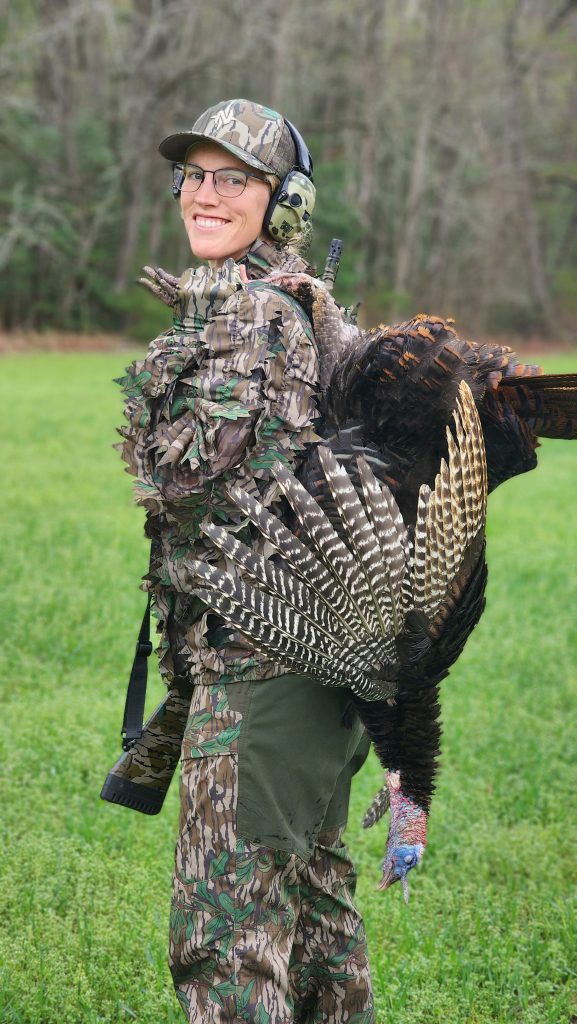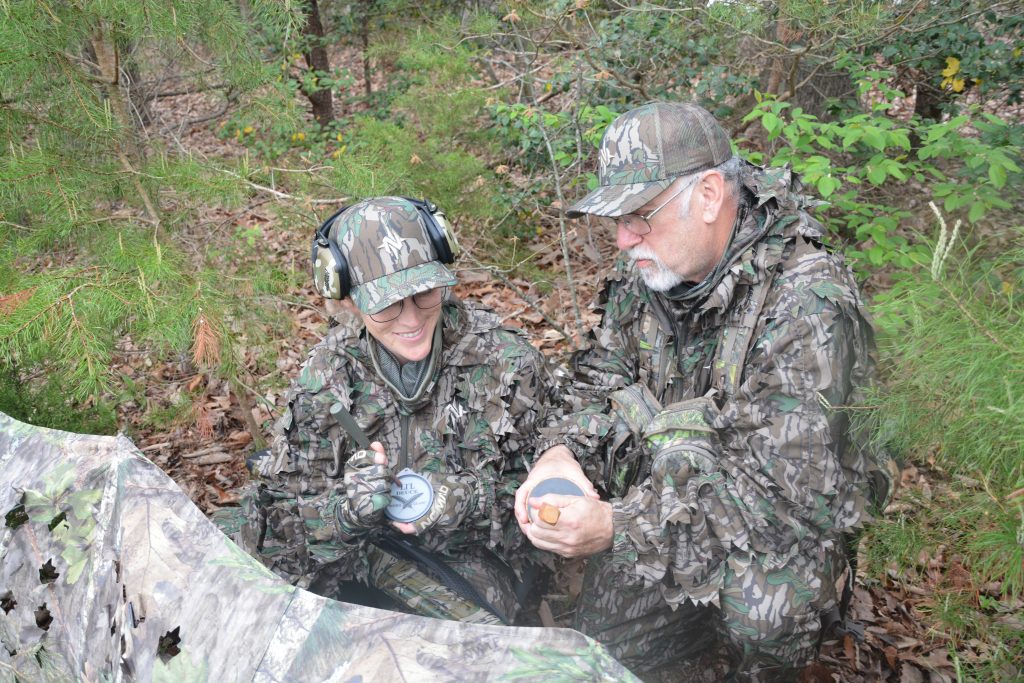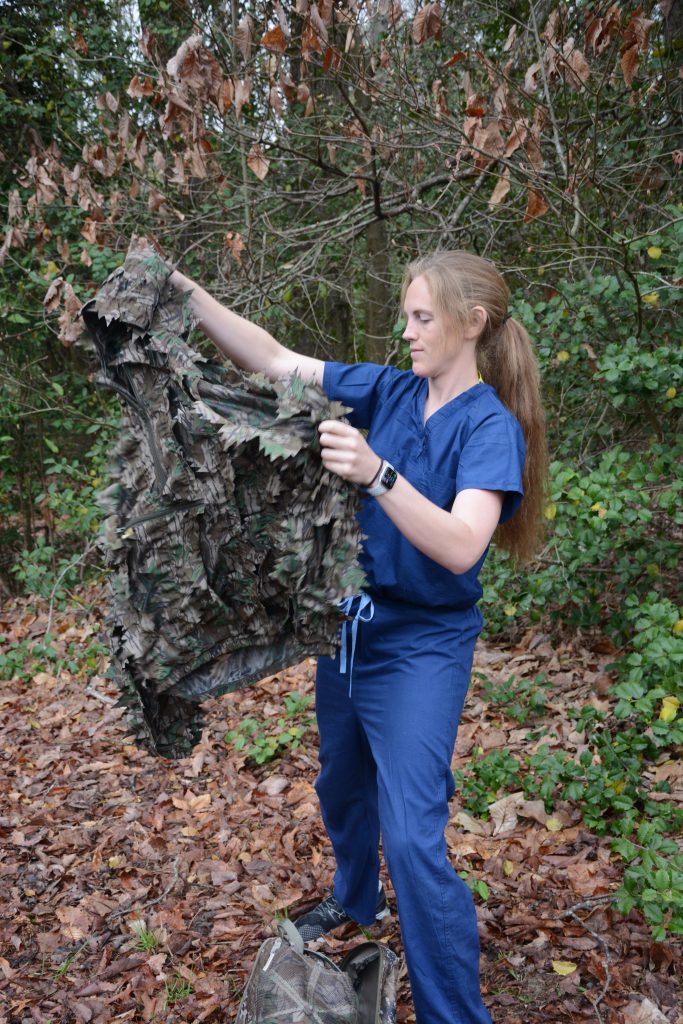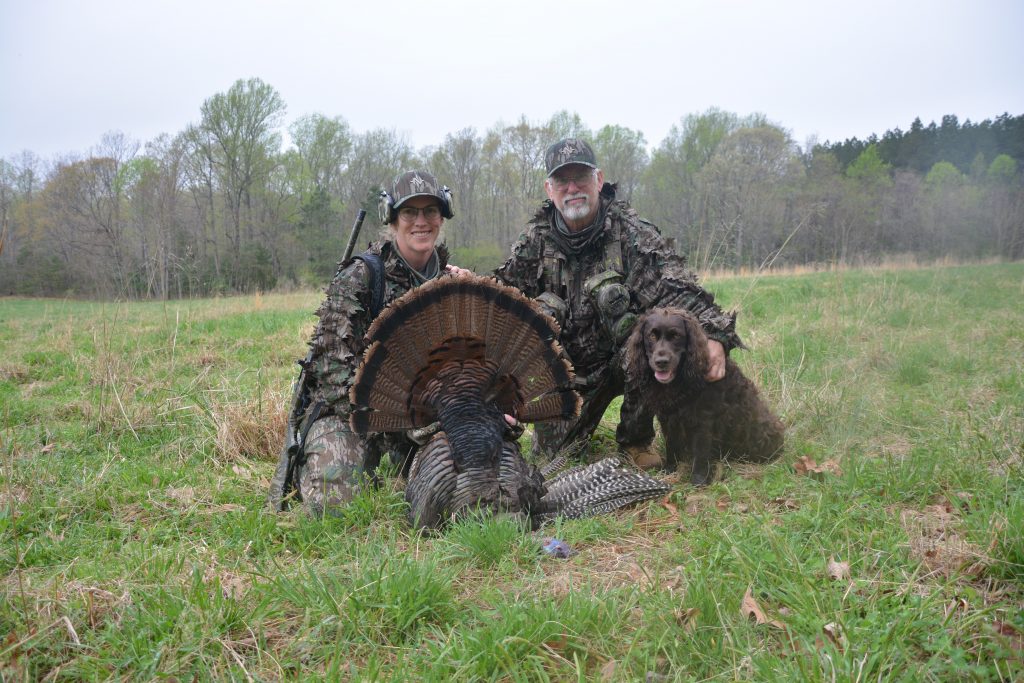The Doctor Is In
After working the midnight hospital shift, Astrid Overholt, M.D., joins the ranks of turkey hunters.

Astrid Overholt’s left hand was shaking slightly as she removed it from the forend of her shotgun. She flexed her fingers and drew a slow, deep breath. Adrenaline was kicking in as she patiently waited for the two turkeys in front of her to get enough separation to offer a shot.
Seasoned hunters know that a few minutes can seem like an eternity when birds are maneuvering in tight formation around he decoys. “OK, I’m going to make them stop,” I whispered as the birds presented an opportunity. Overholt’s Mossberg shotgun roared, and the bigger of the two birds flopped. She pulled down her facemask and, still shaking a little, flashed a wide-eyed smile, euphoric at joining the ranks of successful turkey hunters.
It’s funny how a seemingly small thing like anticipating a shot at a turkey can generate such a rush. The remarkable thing about Overholt’s experience is she is a medical doctor in her mid-30s, an anesthesiologist with VCU Health in Richmond, Virginia. She regularly works stressful operating room cases ranging from brain surgery to evening shifts that bring in severely injured trauma patients.
Overholt grew up in Pasadena, California, with ancestral roots in Germany, Sweden and Macedonia. She fondly recalls a Swedish-American grandfather who returned annually to Sweden to hunt moose with his family. “He was an incredible man and a great role model,”
Overholt said. “My brother was fortunate enough to go on a moose hunt with him before he passed.”
Her brother Aleksandar sparked an interest in shooting sports, and they frequented ranges together for years.
“I look up to him a lot, and so I have a knack for adopting a lot of his interests,” she said. “I like to think I am a pretty good shot, so translating it to something useful like hunting seemed reasonable.”
Overholt’s fiancé also wanted to reconnect with his boyhood hunting roots and that, too, prompted her to consider hunting. “Without a mentor, I don’t think I would have taken the plunge,” she said. “It seemed too hard of a world to break into.”
Enter Jessica Kelley, a nurse anesthetist and a co-worker of Overholt. I had mentored Kelley, helping her take her first deer and introducing her to a local hunt club.
“Talking to Jessica about what she was doing got me excited,” Overholt said. “Her exuberance and glowing recommendation helped me get over my fear of failure and of how challenging of a prospect getting into hunting would be.”
Basically, Overholt asked, “Will you teach me how to hunt?”
We met at a friend’s ample estate, which has an elaborate personal shooting range. There, she proudly showed me a listing on her phone of every type of firearm she has shot. “I’ve never shot a shotgun,” she said, “but I want to.”
I brought a variety of hunting firearms for her to try, from shotguns to a .300 Win. Mag. She backed up her claim of being a good shot by executing a nearly 1-inch three-shot group with the .300.
Patient Journey
The mentorship began just before Virginia’s 2023 deer season, but getting together to hunt was a challenge, given her work and travel schedules, including trips for outdoor adventures that included SCUBA diving, mountain climbing and more.
The next spring saw us sitting along a field, tucked into a hedgerow and trying to call in a gobbler. Everything was working perfectly until it wasn’t. The bird may have seen one of us move, and it quickly fled.
Even though we didn’t tag anything during our first experiences afield, Overholt wasn’t dejected. With encouragement, she purchased a muzzleloader for Virginia’s early season, which is when opportunities are greatest to score some venison. It paid off when she took her first deer, a spike, on opening day. Kelley, who was hunting nearby, eagerly helped her field-dress the deer, hang it, and then skin and quarter it.
Overholt called her mother, Stanislava, while the deer was being skinned. “I’m cooking venison for Christmas this year,” she said with abundant satisfaction.
It was time to return to the turkey woods this past April. Overholt has a Virginia hunting apprentice license, a two-year introductory deal that lets a novice or young hunter learn from a mentor. A hunting safety course isn’t required, but Overholt completed it anyway. The key is the new hunter must be closely accompanied by someone who can coach, give verbal instructions and, if necessary, take control of the firearm. Virginia offers youth and apprentice hunters a special early weekend turkey hunt before the regular season begins.
“Without it (the apprentice program), I think the likelihood of me becoming an amateur hunter would have been a lot smaller,” Overholt said. “I’m so appreciative of the guidance I’ve received, of having someone beside me while I was learning to not just take a deer or turkey, but also showing how to care for my equipment, set up stands, dress and process the meat. Without previous experience, there was no way I would have successfully done all this had I not been able to be an apprentice.”

Respect
Overholt’s turkey success came quickly this year. She worked the overnight trauma shift at the hospital in Richmond, and then drove for an hour, arriving for the hunt at 8 a.m., still wearing her scrubs. She slipped on Nomad camo in Mossy Oak Greenleaf, and we headed for a place where I’d routinely seen turkeys in the previous weeks.

Two hours after we set up, a lone hen emerged to our right from the woods. I whispered to Overholt, “She likely won’t be alone long at this time of the year.” A couple of minutes later, a pair of jakes joined the hen. As the birds made their way to our decoy spread, Overholt’s adrenaline went into overdrive.
“I honestly was really surprised,” she said. “I’m sure I’ll slowly get more accustomed to the feeling, as I do with the traumas I manage at the hospital. With my deer, it was potentially my first big (game animal), and I really wanted to make a clean shot. I was not expecting to feel it for the turkey. I think it shows that hunting isn’t about a desire to just kill but rather having respect for the animals we harvest to provide for our families. I feel that rush of adrenaline was my body acknowledging this was real, and that I had to make a good clean shot, because these animals deserve respect even in their harvest.”

Overholt, a new NWTF member, said conservation and responsible land management are priorities for her. “Humans have done an incredible job shaping the planet to fit our needs, but the repercussions require our continued participation — both in limiting overpopulation of animals that can harm other ecosystems, and the restoration of populations to bring balance back,” she said. “I will always consider wild game to be the most ethical source of meat, so the more we can do to support the natural populations of wildlife, the better.”
Hunting dovetails nicely with Overholt’s other outdoor lifestyle passions.
“I thrive on hiking and backpacking, skiing in the mountains, paddling rivers and streams, mountain biking through forests, generally immersing myself in the experience of living,” she said. “Hunting has become a new offshoot of this desire, as I’m now learning to connect with the animals, learn their habits and behaviors, and while I am using it to ultimately harvest meat, I am also learning more about the world around me and the rhythms of its inhabitants.”
Eventually, her goal is to become self-sufficient as a hunter, developing the skills to hunt independently, whether for deer, turkeys or other game birds.
... A Little More Country
She says her family is excited for her.
“They’re grateful for the meat it provides, and they’re proud of my small but still real successes,” Overholt said, adding that hunting eliminates the middleman — the farmers, ranchers and processing house people who “do the dirty work, so all we have to do is choose packaged cuts at the grocery store.”
As a medical professional, she realizes she can play a unique role as a bit of an ambassador for conservation, especially among her peers. “A lot of my co-workers are surprised by it (hunting) because it’s not what they would expect for some West Coast gal whose job revolves around preserving and saving lives,” Overholt said. “But they are also supportive and interested to know more about what we have been up to out in the woods.”
She also works at a VCU hospital in Tappahannock, a much more rural area than urban Richmond.
“On the other hand, the team in Tappahannock is very keen on it,” she said. “All the nurses there love to show me their deer that they’ve taken, too. Maybe there’s a little more country in me than I previously thought.”